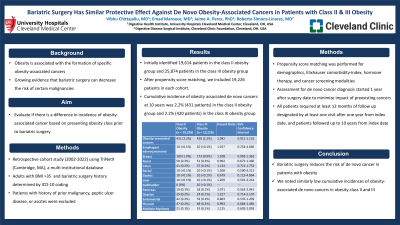Tuesday Poster Session
Category: Obesity
P4039 - Bariatric Surgery Has Similar Protective Effect Against De Novo Obesity-Associated Cancers in Patients with Class II and III Obesity
Tuesday, October 24, 2023
10:30 AM - 4:00 PM PT
Location: Exhibit Hall

Has Audio

Vibhu Chittajallu, MD
Case Western Reserve University / University Hospitals
Cleveland, OH
Presenting Author(s)
Vibhu Chittajallu, MD1, Emad Mansoor, MD1, Jaime A. Perez, PhD2, C. Roberto Simons-Linares, MD3
1Case Western Reserve University / University Hospitals, Cleveland, OH; 2University Hospitals Clinical Research Center, Cleveland, OH; 3Cleveland Clinic, Cleveland, OH
Introduction: Obesity is associated with specific obesity-associated cancers, and there is growing evidence that bariatric surgery can decrease the risk of certain malignancies. We sought to evaluate if there is a difference in incidence of obesity-associated cancer based on presenting obesity class prior to bariatric surgery.
Methods: This was a retrospective cohort study (2002-2022) using TriNetX (Cambridge, MA), a multi-institutional database from 82 US healthcare-organizations, containing data on >100 million patients. Adults with BMI ≥35 to < 40 (class II obesity) and BMI ≥40 (class III obesity) were identified by ICD-10 coding. History of bariatric surgery (Roux-en-Y gastric bypass, sleeve gastrectomy, and gastric band) was determined by ICD-10 coding. Patients with history of prior malignancy, peptic ulcer disease, or ascites were excluded. Propensity score matching was performed for demographics, Elixhauser comorbidity-index, hormone therapy, and cancer screening modalities. We utilized the International Agency for Research on Cancer to determine cancers with sufficient evidence to be considered associated with obesity. Assessment for de novo cancer diagnosis started 1 year after index date: time of bariatric surgery for patients with class II or III obesity to minimize impact of preexisting cancers. All patients required at least 12 months of follow up designated by at least one visit after one year from index date, and patients were followed up to 10 years from index date.
Results: We initially identified 19,614 patients in the class II obesity group and 25,874 patients in the class III obesity group. After propensity score matching, we included 19,226 patients in each cohort. The cumulative incidence of obesity associated de novo cancers at 10 years was 2.2% (431 patients) in the class II obesity group and 2.2% (420 patients) in the class III obesity group (HR 1.042 [CI 0.911-1.191]). No significant differences were seen in incidence rates for specific obesity-associated cancers between obesity classes.
Discussion: Bariatric surgery significantly decreases the risk of de novo cancer in patients with obesity, and we noted similarly low cumulative incidence of obesity-associated de novo cancers in obesity class II and III. This study supports the importance of treating obesity with bariatric surgery, regardless of initial obesity class, to reduce societal and economic burden of cancer.

Disclosures:
Vibhu Chittajallu, MD1, Emad Mansoor, MD1, Jaime A. Perez, PhD2, C. Roberto Simons-Linares, MD3. P4039 - Bariatric Surgery Has Similar Protective Effect Against De Novo Obesity-Associated Cancers in Patients with Class II and III Obesity, ACG 2023 Annual Scientific Meeting Abstracts. Vancouver, BC, Canada: American College of Gastroenterology.
1Case Western Reserve University / University Hospitals, Cleveland, OH; 2University Hospitals Clinical Research Center, Cleveland, OH; 3Cleveland Clinic, Cleveland, OH
Introduction: Obesity is associated with specific obesity-associated cancers, and there is growing evidence that bariatric surgery can decrease the risk of certain malignancies. We sought to evaluate if there is a difference in incidence of obesity-associated cancer based on presenting obesity class prior to bariatric surgery.
Methods: This was a retrospective cohort study (2002-2022) using TriNetX (Cambridge, MA), a multi-institutional database from 82 US healthcare-organizations, containing data on >100 million patients. Adults with BMI ≥35 to < 40 (class II obesity) and BMI ≥40 (class III obesity) were identified by ICD-10 coding. History of bariatric surgery (Roux-en-Y gastric bypass, sleeve gastrectomy, and gastric band) was determined by ICD-10 coding. Patients with history of prior malignancy, peptic ulcer disease, or ascites were excluded. Propensity score matching was performed for demographics, Elixhauser comorbidity-index, hormone therapy, and cancer screening modalities. We utilized the International Agency for Research on Cancer to determine cancers with sufficient evidence to be considered associated with obesity. Assessment for de novo cancer diagnosis started 1 year after index date: time of bariatric surgery for patients with class II or III obesity to minimize impact of preexisting cancers. All patients required at least 12 months of follow up designated by at least one visit after one year from index date, and patients were followed up to 10 years from index date.
Results: We initially identified 19,614 patients in the class II obesity group and 25,874 patients in the class III obesity group. After propensity score matching, we included 19,226 patients in each cohort. The cumulative incidence of obesity associated de novo cancers at 10 years was 2.2% (431 patients) in the class II obesity group and 2.2% (420 patients) in the class III obesity group (HR 1.042 [CI 0.911-1.191]). No significant differences were seen in incidence rates for specific obesity-associated cancers between obesity classes.
Discussion: Bariatric surgery significantly decreases the risk of de novo cancer in patients with obesity, and we noted similarly low cumulative incidence of obesity-associated de novo cancers in obesity class II and III. This study supports the importance of treating obesity with bariatric surgery, regardless of initial obesity class, to reduce societal and economic burden of cancer.

Figure: Obesity-Associated Cancer Incidences By Obesity Class
Disclosures:
Vibhu Chittajallu indicated no relevant financial relationships.
Emad Mansoor indicated no relevant financial relationships.
Jaime Perez indicated no relevant financial relationships.
C. Roberto Simons-Linares indicated no relevant financial relationships.
Vibhu Chittajallu, MD1, Emad Mansoor, MD1, Jaime A. Perez, PhD2, C. Roberto Simons-Linares, MD3. P4039 - Bariatric Surgery Has Similar Protective Effect Against De Novo Obesity-Associated Cancers in Patients with Class II and III Obesity, ACG 2023 Annual Scientific Meeting Abstracts. Vancouver, BC, Canada: American College of Gastroenterology.
